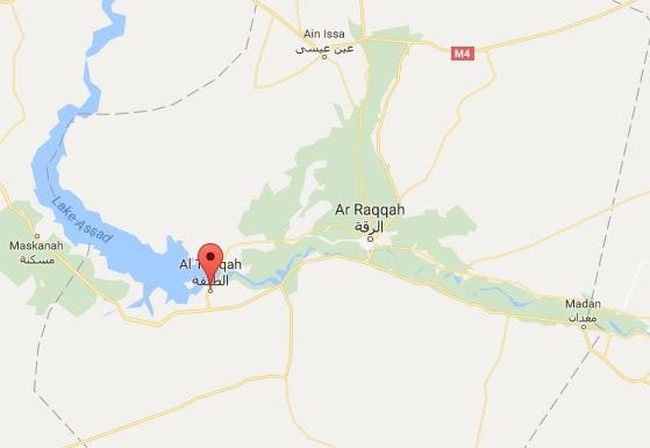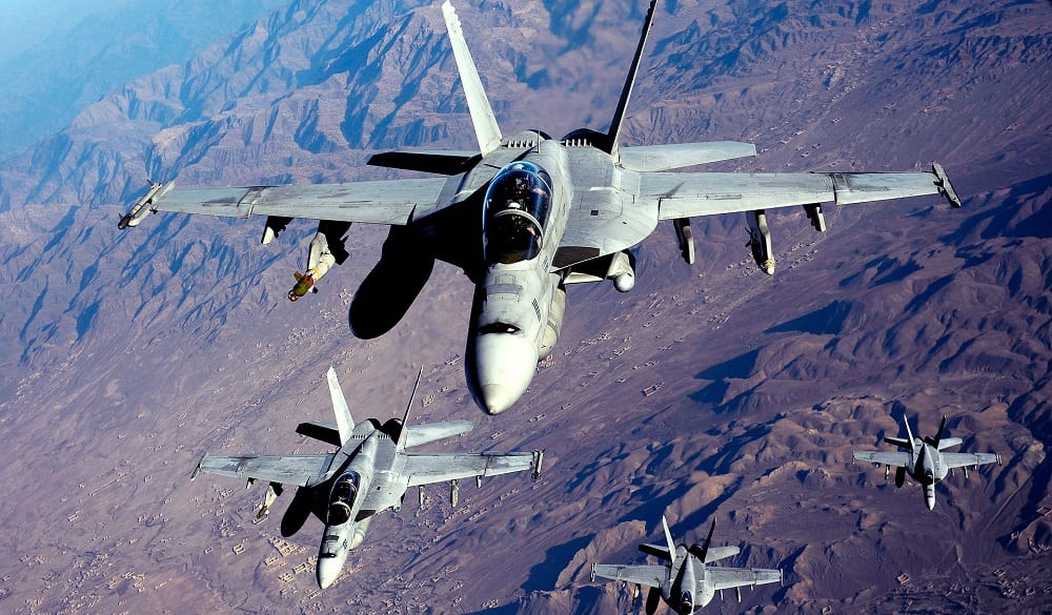Yesterday, a US Navy F/A-18E Super Hornet, presumably flying from the USS George H. W. Bush (CVN-77), dropped a Syrian SU-22 near the Syrian town of Tabqah. Tabqah has been the scene of heavy fighting as US-sponsored Syrian forces, working in conjunction with Kurdish Peshmerga, are encircling the Islamic State “capital” of Raqqa.

The genesis of the shootdown of the Syrian strike aircraft was it attacking the coalition forces. This is a game Syria and Russia have been playing for quite a while. Though they give lip service to fighting ISIS, Russia and Assad find ISIS to be a useful ‘frenemy’ and foil. The Assad regime is consolidating its hold over major population areas and is perfectly content to have the Syrian opposition forces and ISIS fight to the last man. The presence of ISIS gives Russia a colorable legitimacy for their military presence.
This is the second time US aircraft have shot down a Syrian regime aircraft. On June 8, a USAF F-15E destroyed a regime drone as it was dropping munitions on allied Syrian forces near the US/UK base at al Tanf, Syria.
In yesterday’s incident, the US military alerted Russian authorities via the established “deconfliction” channel to get the Syrians to cease and desist. The Russians did not respond. The Syrian aircraft was warned on the international military GUARD frequency. Thanks to President Trump handing the management of military operations back to military commanders, there were no calls to the NSC and no interagency staff meeting to decide what to do. When the inevitable happened Russia is suddenly claiming that the US never tried to contact them and, adding insult to injury, the Syrian aircraft was striking ISIS targets.
This is laughable. The US military is so over-lawyered that it is impossible to conceive of a set of circumstances where warning would not be given–we gave the Russians three hours notice of the Tomahawk strike against the Syrian air force back in April–and there is no logical reason why Syrian regime aircraft would be flying strike missions in an area where their troops are not fighting but where “friendly” Syrians are. The most logical reasons are the standard Russian tactical principles of incompetence and stupidity doused with cheap alcohol.
Having lost a ton of face with their Syrian allies and in the Arab world, the Russians have pulled the plug on the “deconfliction” channel and declared they will treat any aircraft west of the Euphrates as hostile.
Russia’s defense ministry says it will treat U.S.-led coalition planes in Syria, west of the Euphrates River, as targets after the U.S. military shot down a Syrian Air Force jet on Sunday.
…
Russia’s defense ministry says it is suspending coordination with the United States in Syria over so-called “de-confliction zones” after the Americans downed a Syrian government fighter jet.
What does this mean?
The major US base, al Tanf, is decidedly west of the Euphrates and it has air cover to prevent incursions by Iranian-backed militias into a 50-mile security buffer around the base. We’ve attacked three separate attempts by hostile forces after they refused to leave the buffer area. So if the Russians have it in their mind to treat US aircraft as hostile they will have more than enough opportunity to do so.
Russian capabilities, though, are a different matter. Their air defense systems, even with three hours warning, were unable to engage US Tomahawks. The Syria air force is singularly unable to carry out this threat and the Russians have between 30 and 40 aircraft in Syria. The quality of Russian pilots was never all that great even at the height of the Cold War and it is pretty doubtful they’d risk a fighter vs. fighter encounter, though Cold War-style “chicken of the sea” maneuvers will inevitably take place. The risk comes from the S-300 and S-400 surface-to-air missile systems.
On the whole, we can expect this to result in nothing. The deconfliction channel will be quietly reestablished because the Russians have more to lose than the Syrians by not playing. The real question is whether this modifies the behavior of the Russians and Syrians or inspires them to seek retaliation.













Join the conversation as a VIP Member